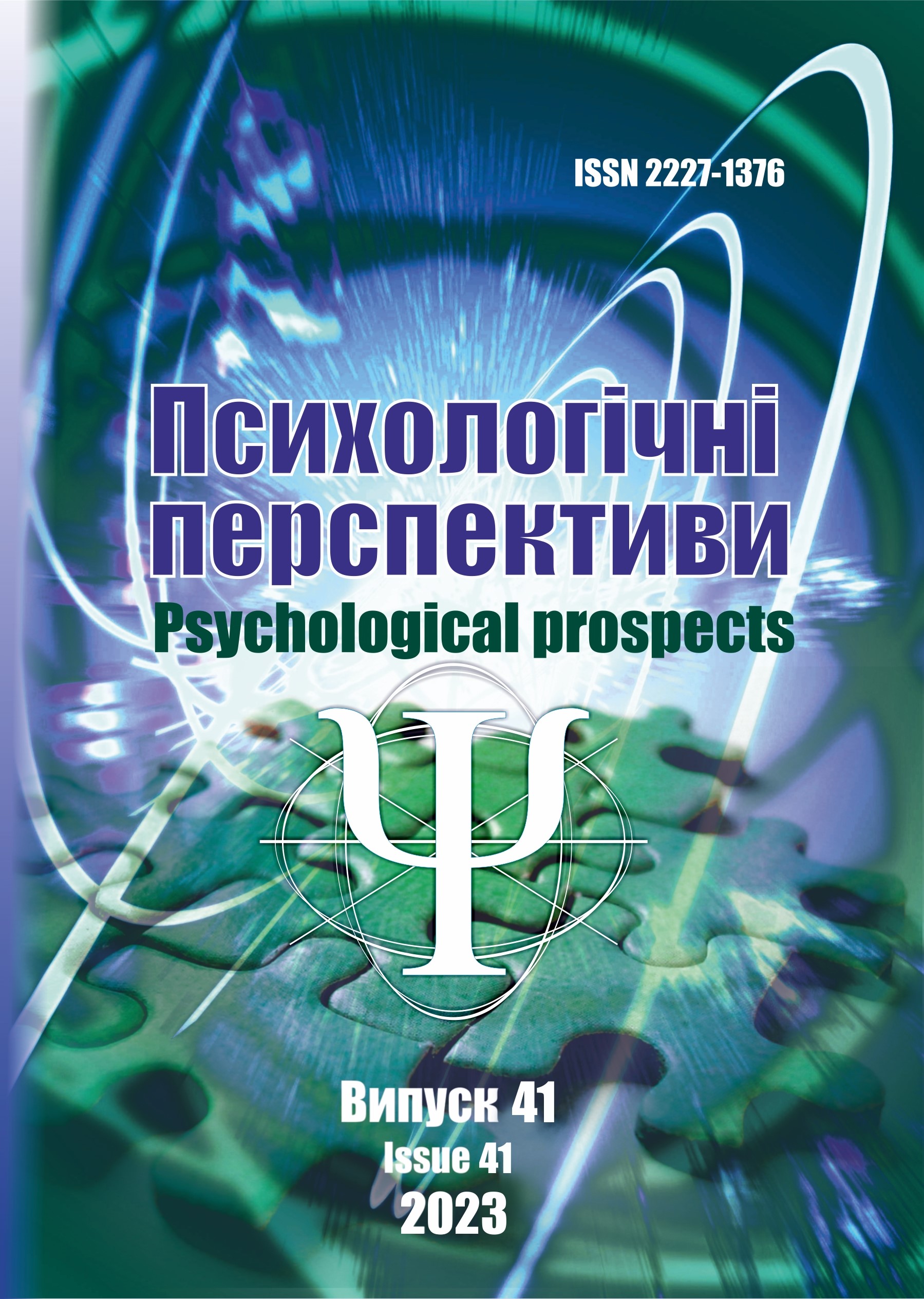Constructive psychology as a technology for human psyche transformation
DOI:
https://doi.org/10.29038/2227-1376-2023-41-virKeywords:
constructive psychology, constructive / destructive psyche development, technological knowledge, psychotechnologies, constructive psychologistAbstract
Purpose. The article is devoted to the constructive psychology theoretical justification as a science of optimal functioning, effective reproduction and integral development of a person during the life. The purpose of the theoretical review is the methodological substantiation of constructive psychology as a technology in the psychological science functional structure.
Methods. The basis is the method of psychological modeling as a theoretical reproduction of the logic of the constructive psychology development as a human psyche transforming technology.
Results. The theoretical justification of the problem includes consideration of the constructive psychology formation stages and options for their interpretation. An overview of the philosophical direction of constructivism and the main constructivist approaches (radical constructivism, social constructivism, constructive alternativeism) is carried out. Based on these approaches, the basic developmental and humanitarian positions of constructive psychology, its structure and main functions are described, and its scientific transformative intent in the study of the human psyche is emphasized. A scientific knowledge levels scheme of psychology is proposed and technological knowledge of constructive psychology is defined as an epistemological product of its reflexive functioning. In the methodological situation of psychology development, constructive psychology is assigned the role of integrating knowledge about the development of the human psyche. The issue of training constructive psychologists as specialists in applied fields of psychology, who will be able to implement the theory and practice of self-management in social and applied spheres, has been updated. The main tasks of the constructive psychologist, his methodological base and areas of application of his professional knowledge and skills, requirements for his personality and efficiency of activity are outlined.
Conclusions. Psychological education with the involvement of constructive psychology will provide an opportunity to improve the psychological education main criteria and indicators of the quality.
References
Vilhelm Diltei i filosofiia «dukhovno-naukovoho» znannia [Wilhelm Dilthey and the philosophy of "spiritual-scientific" knowledge]. (2011). Chernivtsi : Chernivetskyi nats. un-t. [in Ukrainian].
Virna, Zh.P. (2021). Konstruktyvna psykholohiia zhyttia: sylabus navchalnoi dystsypliny pidhotovky doktora filosofii [Constructive psychology of life: the syllabus of the educational discipline for the preparation of the doctor of philosophy]. Lutsk: Lesya Ukrainka Volyn National University. URL: https://evnuir.vnu.edu.ua/bitstream/123456789/19658/3/konstrukt_psyhol.pdf [in Ukrainian].
Virna, Zh.P. (Eds.). (2015). Psykholohiia profesiinoi bezpeky: tekhnolohii konstruktyvnoho samozberezhennia osobystosti [Psychology of professional safety: technologies of constructive self-preservation of the individual]. Lutsk : Vezha-Druk. [in Ukrainian].
Virna, Zh.P. (2017). Psykholohichni koordynaty konstruktyvnoho samozberezhennia osobystosti [Psychological coordinates of constructive self-preservation of the individual]. Naukovyi visnyk Mykolaivskoho nats. un-tu im. V.O. Sukhomlynskoho. Psykholohichni nauky – Scientific Bulletin of Mykolaiv National University. University named after V.O. Sukhomlynskyi. Psychological sciences, 1, 35-40. [in Ukrainian].
Danylian, O.H., Dzoban, O.P. (2019). Metodolohiia naukovykh doslidzhen [Methodology of scientific research]. Kharkiv : Pravo [in Ukrainian].
Konstruktivna psihologiya i profesionalizatsiya osobistosti : materiali mizhregionalnogo naukovogo seminaru [Constructive psychology and professionalization of specialness : materials of the interregional scientific seminar]. (2002). Lutsk[in Ukrainian].
Larin, D. (2019). Smisli profesiyi maybutnih psihologiv [Meanings of the profession of future psychologists]. Kiyiv : Globus. [in Ukrainian].
Maksimenko, S.D. (2006). Geneza zdiysnennya osobistosti [The genesis of personality realization]. Kiyiv : Izd-vo OOO «KMM» [in Ukrainian].
Stoliarenko, O.B. (2012). Psykholohiia osobystosti [Personality psychology]. Kyiv: Tsentr uchbovoi literatury [in Ukrainian].
Ialanska, S., Moliako, V. (2018). Psykholohiia protystoiannia konstruktyvnoho ta destruktyvnoho [The psychology of confrontation between constructive and destructive]. Poltava : Vydavnytstvo «Simon». [in Ukrainian].
Castanon, G.A. (2005). Construtivismo e terapia cognitiva: questões epistemológicas [Constructivism and cognitive therapy: epistemological issues.]. Revista Brasileira de Terapia Cognitiva – Brazilian Journal of Cognitive Therapy, 1(2), 31-42. http://pepsic.bvsalud.org/scielo.php?script=sci_arttext&pid=S1808-56872005000200004&lng=pt&nrm=iso [in Portuguese].
Construtivismo crítico: uma filosofia da tecnologia [Critical constructivism: a philosophy of technology]. (2022). São Paulo: Associação Filosófica Scientiae Studia. https://www.scientiaestudia.org.br/publicacoes/colecao/resenhas/amostra-construtivismo-critico-feenberg-2022.pdf [in Portuguese].
Chávez, T. A., Givens, J., Lemberger-Truelove, M. E., Lemberger-Truelove, T. & Palacios, A. F. (2019). Dialogical Meaning and Justice for Constructivist and Existential Psychologies. Journal of Constructivist Psychology, 32(2), 138-147. https://doi.org/10.1080/10720537.2018.1461718 DOI: https://doi.org/10.1080/10720537.2018.1461718
Gergen, K.J. (1994). Realities and relationships, Soundings in social construction. Cambridge. MA: Harvard University Press.
Glasersfeld, E. (1984). An introduction to radical constructivism. The invented reality. (р. 17–40). New York : Norton,
Hoffman, L. (2019). Existential and Constructivist Psychology: A Developing Dialogue. Journal of Constructivist Psychology, 32(2), 105-107. https://doi.org/10.1080/10720537.2018.1461721 DOI: https://doi.org/10.1080/10720537.2018.1461721
Fransella, F. (Eds.). (2003). International handbook of personal construct psychology. UK: John Wiley&Sons, Ltd. URL: https://www.al-edu.com/wp-content/uploads/2014/05/Fransella-ed-International-Handbook-of-Personal-Construct-Psychology.pdf DOI: https://doi.org/10.1002/0470013370
Jackson, R.E. (2013). Evolutionary Constructivist Psychology. Journal of Constructivist Psychology, 26(3), 187-193. https://doi.org/10.1080/10720537.2013.787325 DOI: https://doi.org/10.1080/10720537.2013.787325
Josselyn, S.A., Tonegawa, S. (2020). Memory engrams: Recalling the past and imagining the future. Science, 3, 367-374 https://doi.org/10.1126/science.aaw4325 DOI: https://doi.org/10.1126/science.aaw4325
Maturana, H.R., Varela, F.J. (1992). The Tree of Knowledge. Boston: Shambhala.
Morin, E., Ciurana, E-R., Motta, R.D. (2003). Educar na Era Planetária: O pensamento complexo como método de aprendizagem no erro e na incerteza humana [Educating in the Planetary Age: Complex thinking as a learning method in human error and uncertainty]. São Paulo: Cortez Editora [in Portuguese].
O'Riordan, S., & Palmer, S. (Eds.). (2021). Introduction to Coaching Psychology (1st ed.). Routledge. https://doi.org/10.4324/9781315222981 DOI: https://doi.org/10.4324/9781315222981-13-23
Pavlovic, J. (2018). Embracing Innovation: New Voices in Constructivist Psychology. Journal of Constructivist Psychology, 31(2), 117-117. https://doi.org/10.1080/10720537.2016.1271378 DOI: https://doi.org/10.1080/10720537.2016.1271378
Pavlović, J. (2021). Team Coaching Psychology: Toward an Integration of Constructivist Approaches. Journal of Constructivist Psychology, 34(4), 450-462. https://doi.org/10.1080/10720537.2019.1700856 DOI: https://doi.org/10.1080/10720537.2019.1700856
Raskin, J.D. (2002). Constructivism in psychology: Personal construct psychology, radical constructivism, and social constructionism. Studies in Meaning: Exploring Constructivist Psychology. (рр. 1–25). New York, NY: Pace University Press.
Varela, F.J., Thompson, E., Rosch, E. (1991). The embodied mind: Cognitive science and human experience. Cambridge, MA: MIT Press. DOI: https://doi.org/10.7551/mitpress/6730.001.0001
Downloads
Published
Issue
Section
License
Copyright (c) 2023 Virna Zh.

This work is licensed under a Creative Commons Attribution-NonCommercial 4.0 International License.






